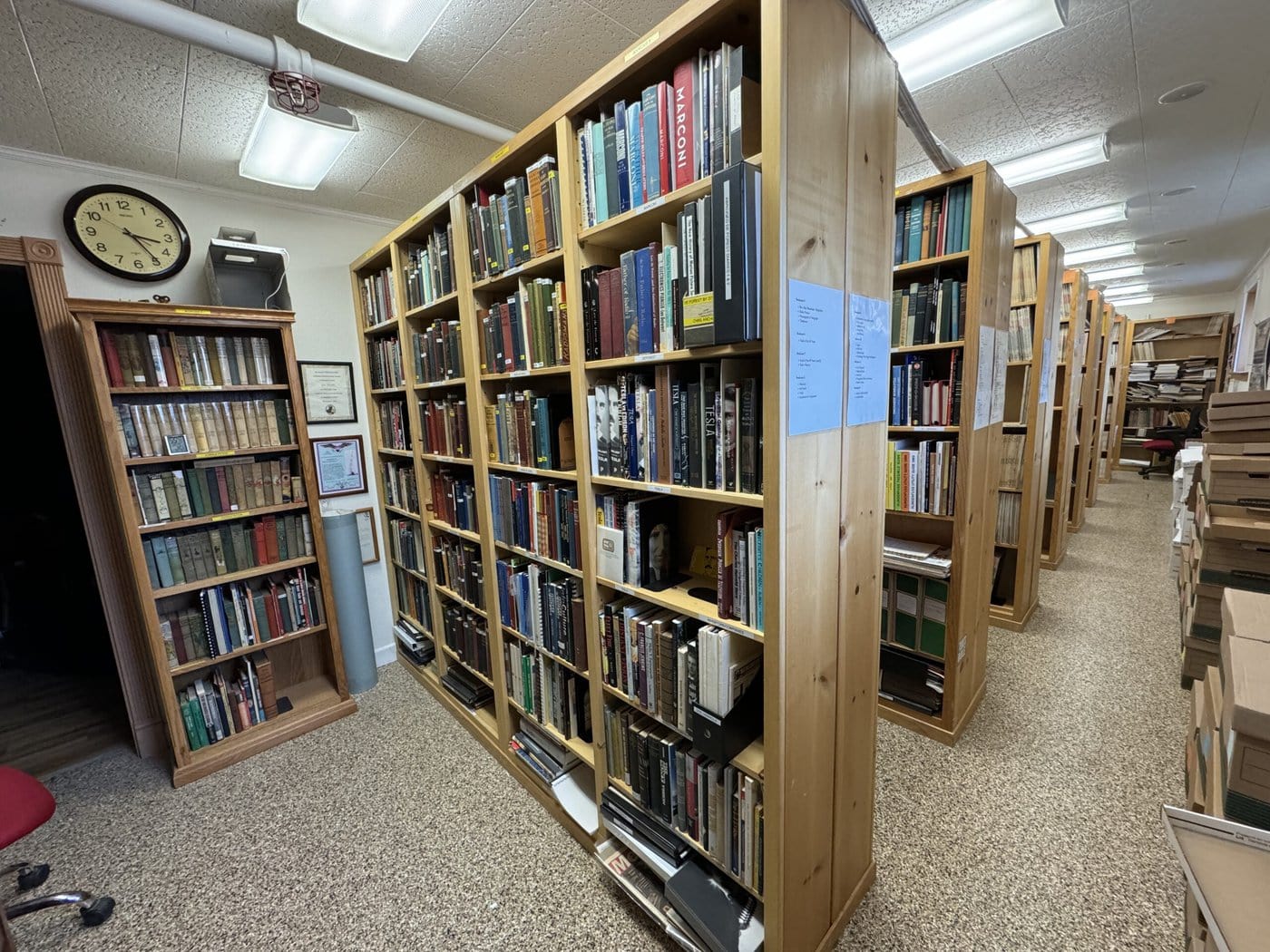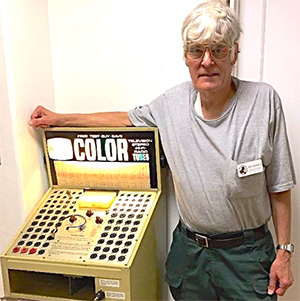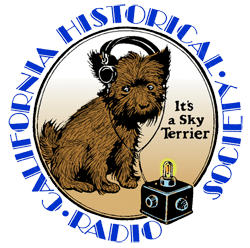CHRS has a number of collections of paper research materials available to view on a limited basis for researchers.
Alameda Radio | Archivist’s Rules | Archivist Note Short Wave List 1930 | Bart Lee’s Radio History Archive | Happy New Year | Judith Radio Boys | KCBS and CHRS Preserve JFK Assassination News Records | Library Archives 2023 | Library and Archives Report | Library Report 2022 | Library Recent Acquisitions Library Misc Manuals | Living Histories | Maritime Archives | Modern Electrics | Old Russian Radio | Pacific Radio News Vol 1 1917 | Project OSCAR | Project OSCAR, Past, Present and Future | Radio Education | Radio Station Sheet Music | See the CHRS Journal Archive 2012-2020 | Steve Lampen Archive | Tesla Books in Library The Library Further Organizes | First California High School Radio | Foregoing Audio Transformers | Wireless Telegraphy Archives | William J Clarke and the First American Radio Company
Dave Harris and Hill Hampton have been organizing the CHRS Maxwell library since the early KRE days. They are meeting new challenges with the integration of the archives into the library. When you can find something in the library, it’s because of their work — their ongoing work. If you have an opportunity, please thank them!



A Thank You Letter from an archive user: My name is Dylan Flesch, I’m a member of the Interference Archive in New York, and I’m currently working with a group there preparing for an upcoming (Summer ’19) exhibit on radio history. I’m also a Research Associate at the Library of Congress Radio Preservation Task Force and for my day job I’m the Media Asset Librarian at the Seattle based radio station and arts organization, KEXP. I’m interested in accessing the California Historical Radio Society Library and Archives in search of materials that may be used in our case studies, or for historical background in our Interference Archive Radio History exhibit. I’m most interested in materials related to early wireless and radio amateurs, but would be excited to browse more as well. KDIA materials are also something I’d be excited to see.
The Interference Archive exhibit focus is, in a broad sense, history of radio efforts that served community not served by mainstream radio. We’re also interested in program offerings not commonly available on mainstream radio. We’re particularly interested in cases where those stations or people were acting in service of social movements and organizing.
The Archives: From Fahie’s 1902 “A History of Wireless Telegraphy,” The last Chapter, Marconi’s Method Archivist’s Note: Now, there’s even more New and Primary History on the CHRS SOWP website
John Staples, W6BM, did this scan (PDF) of the Marconi chapter in J. J. Fahie’s 1902 book “A History of Wireless Telegraphy” newly shelved in the CHRS Library. John notes that “Fahie’s work is rich in lost technical history and a primary source, and I agree it’s quite marvelous.”
Deputy Archivist Bob Ryzdewski notes: “I like the last footnote: ‘The [Marconi] syndicate must hurry up, as Mr. Nikola Tesla is now on their track with a wireless telegraph that will “stagger humanity.” *** When I look at old science texts, it always amazes me how they were able to figure anything out at all with what we would say is weird terminology and murky theories. But that’s all they had, and they did it.”
The question has arisen of the 1902 book and Fahie’s earlier book on wired telegraphy to 1837: “So is J.J.Fahie the first media archaeologist?” ( Archaeologies of telegraphy – J.J.Fahie – Cartographies of Media …mediacartographies.blogspot.com/2010/11/archaeologies-of-telegraphy-jjfahie.html )
One researcher notes of Fahie’s book that it is:
“One of the first histories of wireless communications, J.J. Fahie’s A History of Wireless Telegraphy 1838-1899 (1899), was written by a contemporary to many of the early practitioners within its pages and featured an illustrated list entitled ‘The Arch Builders of Wireless Telegraphy.’ This list stretched from key contributors to the early study of electromagnetism such as Ampère, Faraday, and Maxwell through to developers of early wireless apparatus and systems such as Branly, Lodge, Preece, and Marconi. The equal recognition recorded to these twelve men and the collective contribution of scientists, engineers, government employees, along with men of commerce, to the embryonic field of wireless communications has been mostly ignored in the existing body of scholarship on wireless telecommunications.” (Bruton, Elizabeth Mary (2012) Beyond Marconi: the roles of the Admiralty, the Post Office, and the Institution of Electrical Engineers in the invention and development of wireless communication up to 1908. PhD thesis, University of Leeds; from http://etheses.whiterose.ac.uk/4431/).
The World Catalog notes:
“John Joseph Fahie (1846-1934) was an engineer for the Electric and International Telegraph Company before being posted overseas in the Indo-European Government Telegraph Department. He was also a respected historian whose History of Wireless Telegraphy (1899) sold out two impressions in little over a year. In this second edition (1901), he traces the development of wireless communication during the nineteenth century, drawing extensively from the correspondence and technical illustrations of inventors themselves. This edition was fully updated to take account of the latest advances in radio technology, including Marconi’s latest public demonstrations. As a practising telegraph engineer, Fahie was in the perfect position not only to understand the significance of these developments, but to explain them to a non-specialist audience. Contemporary reviews indicate he did this with great success. His book gives an eyewitness account of the rise of radio technology that still fascinates scholars and enthusiasts today.” (Fahie, J. J. (John Joseph) 1846-1934; from http://www.worldcat.org/identities/lccn-n86868998/)
Reprints of both Fahie books are available on Amazon. com etc. [de K6VK]
The CHRS Library — Primarily David Harris and Hil Hampton, with help, have organized something over 10,000 magazines and maybe 1,000 books, since CHRS’s KRE days: 350 shelves full, more or less. Figure 70% magazines and 30% books. Closer examination will make for better calculations, but to be conservative, the library holds at least 10,000 organized vintage radio magazines and as many as 1,000 organized vintage radio books, a complete amateur radio collection and the like. Download the main library PDF
Another major collection is being digitized by Robert Rydzewski, the Society of Wireless Pioneers
I. After appropriate consultation, here are the RULES OF THE LIBRARY:
1) Shelf stable (e.g., bound) books and magazines, etc. go on the shelves and nothing else goes on the shelves or the floor, and nothing above the shelves (a fire-safety regulation). Anything not shelf-stable (e.g., single sheets) and everything before 1920 goes into the Archives, on the upper level. Staff will arrange work spaces.
2) NO LIQUIDS in the library, no coffee, no soda, no water; the same for the Archives, because we have an obligation to protect what we deem appropriate to preserve. leave them all outside the doors, please.
3) No office machines in the library: office machines such as scanners, printers and computers belong in the new office, or near but not in the Archives. Library and archive space is limited and office work is distracting to staff.
II. Thanks to all for saving the library from the flood! (as well as the rest of RadioCentral!) We have a great and well-organized library because of the work of Hil Hampton and Dave Harris. (After appropriate consultation, they will join, as Assistant Librarians, new Deputy Librarian Judith Girardi.)
III. On Tuesday a week before Radio Day, I de-cluttered the library — because there was lots of post-flood debris left in it, and various heavy objects had taken shelter in it to keep dry. I moved many (too many) heavy objects out to the gallery space. The rest of the junque got moved out and away on Saturday the week before Radio Day. Then the floors needed to be cleaned, and they got cleaned. Thanks to all who helped!
I am text block. Click edit button to change this text. Lorem ipsum dolor sit amet, consectetur adipiscing elit. Ut elit tellus, luctus nec ullamcorper mattis, pulvinar dapibus leo.

